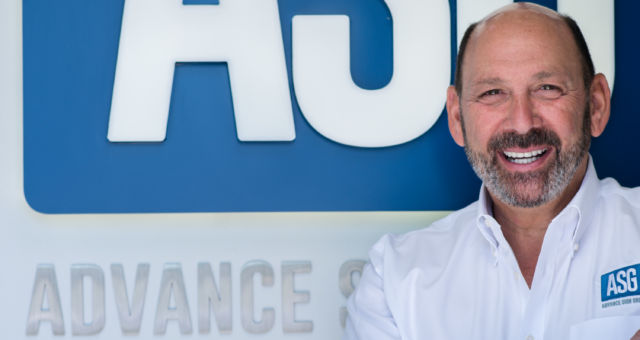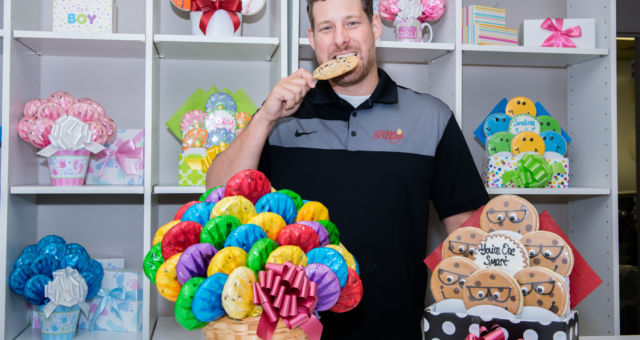What is your full name, title, and business name?
Stefan Thomas, Director & Co-Owner, Thomas Ingram Law Group
Give us a summary of your business in 200 words or less.
We are a full service boutique law firm providing creative solutions to a myriad of clientele.
How did the idea for your business come about?
It came about after my business partner and I spent some time practicing law as solo practitioners. We both came from large firms and decided to spend some time exploring the legal and business spaces on our own. After some time, we analyzed our practices, the overlap of work, and integration of clients between both practices, and decided it would be a great idea to merge. We liked the idea of creating a new culture and approach to client engagement as a team, so we worked on a merger for several months, until we finally launched.

What was the turning point for your business? Was there a moment you knew you had something special?
According to my Gallup results, I’m an “Achiever.” With that, I have a somewhat difficult time with feeling that I’ve reached a turning point. Though I didn’t qualify my incessant climbing until Gallup, I realize that I’m always climbing for something. So, basically, I’m not sure if the turning point has been reached because I may subconsciously be continuously moving the markers!
What does it mean to you to be an entrepreneur and business owner?
For me, it means responsibility, accountability, and freedom.
From a responsibility standpoint, because of the industry I have to levels of responsibility. One level of responsibility is the ethical duties owed to our industry and clients, ensuring the proper handling of from matters from conflicts of interests to financial assets. On the other level, I have a responsibility to the business. From a client position, I am charged with proper issue identification, solution ideation, and execution of the matter. From a business position, I believe I have a duty to generate and sustain process to assist in the growth and longevity of the firm.
As it relates to accountability, I think its fairly apparent that I have to be open and willing to meet expectations of clients stemming from our expectation-set. And, be responsive and transparent as it relates to the same. As a co-owner, I believe there is some juggling. There’s being responsive to the checks-and-balances of firm aspirations and vision. Then, there’s the duty to show up for my partner. And, finally, there’s my duty to myself and my own vision of my personal brand and trajectory.
Finally, there’s freedom. But, it’s on so many levels. There’s the apparent time autonomy. There’s boundless opportunity for financial growth based, which, from a career perspective, can be restricted by the conventional employment structure. There’s a creative freedom relating to the ability to create your work environment and flows. There’s personal freedom that allows you to engage differently with self, friends, family, and mankind. And, there’s exploratory freedom. Though I’m dealing in one endeavor, I have the ability to control my time to consider, create, or research other ventures. But, I think this freedom times back to responsibility and accountability.
What does the city of Columbus mean to your business?
It means natural relationships. Since I was born and raised in Columbus, I have true relationships from each aspect of life. And, in this industry, most relationships are critical to opportunities. These relationships are sometimes a leg-up because people just naturally think of you in an industry where there are a number of strong players and networking is a constant.
What’s the number one piece of advice you’d give to anyone wanting to start a business?
Structure. People come into business different ways, inheritance, stroke of genius, planning, research, and who knows. However, a lot of businesses lack structure. Identifying and establishing processes to contribute to a strong infrastructure helps with identifying growth, development, and learning opportunities. And, with the peaks and valleys that come with entrepreneurship and business ownership, it provides stability and an anchor.

What do you wish you knew about entrepreneurship before starting your business?
The amount of patience needed. There’s patience needed refining your place in the market, brand recognition, streamlining operations, discovering internal and external potentials, and financial growth. And, there’s patience needed in learning to trust yourself, the spirit, and the path.
What’s the most challenging part of your business (i.e, what keeps you up at night)?
I think one of the most challenging parts is getting in front of players to exhibit your strengths. There’s a perception that smaller-manned and/or younger businesses may not have the manpower or skillset to handle certain matters or certain sized matters. So, determining tactics to overcome this barrier is a constant.
Every business owner has a flaw. What’s yours?
Personally, I tend to want to do everything that I think the company needs. I read books on business, operations, and scaling and want to enact or test all the theories on the firm. I think it drives my partner crazy sometimes. So, I’m working on prioritizing what I want, presenting an argument to myself and my business partner as to why it’s needed or could be beneficial, and then incorporating as appropriate.
Why do you think most business owners fail? What has made you different?
I think failure is relative. It truly depends on how it’s defined by the subject. To one, failure may be no longer having a business, while to another it may be spending a certain amount of hours in the business. So, I think it’s a tricky question. If from a basic “the business didn’t survive” and the business owner desired survival, I think structure, access to financing, misunderstanding of consumer’s need, and willingness to purchase the good or service can all be attributable.
I think the firm’s continued existence thus far is attributable to a cocktail of sorts. I think there are hard contributors like my partner’s and my professional backgrounds, good relationships, and quality execution of services. And, I think there are soft contributors like responsiveness to clients, having differing aesthetics from traditional legal aesthetics, and a bunch of prayer!

What was your biggest mistake and what did it cost you?
Questioning my financial worth. It’s really difficult to value your services and yourself. And, because they are essentially one and the same in my industry, it’s doubly difficult. When you are in a big firm, you don’t have the same battle of convincing external parties of your rates because the firm presents them. The struggle is more internal there. But, when it’s your business, beyond market research and demand, it can be difficult determining value and presenting it to the public. It’s an ongoing battle, though not as bad as in the past. It quite honestly cost me money and time.
What tool has helped you the most for your business (invoicing, accounting, shipping, plugin for website, etc.)?
MyCase. MyCase is a client management software for legal businesses. It has helped in processing and managing client relations from intake to closure and providing secure communication systems with clients.
When did you know it was time to expand your business, make your first hire, etc.?
My firm has not done too much expanding. However, when we add players it’s generally related to volume of work and feasibility of quality completion, building out a practice area that has strong monetary potential, and/or fulfilling roles that afford more times to the attorneys to develop client relations, practice areas, and networks.
What is something that you did that was a game changer for your business?
Two things. Becoming a professor has been an unexpected benefit. It has allowed me to contribute to the development of society while increasing my own substantive knowledge of areas in which I practice. And, owning and operating other businesses has increased my awareness to business needs and practical reactions of business functions, which gives me an edge when interacting and advising business and entertainment clients.
What is something that your business spends a lot of money on that’s worth it?
Information technology. We do fairly well with maintaining lean overhead. But, information technology is something that stands out. As an attorney, communication and security are vital. So, operating in a time of convenience makes maintaining systems for ease of use by clients critical. So, having a strong onsite and offsite communications system is vital. And, having encrypted systems are a must. It’s a bonus having an IT team that’s personal, approachable, and informed.
What is something you’re working on now that you’re very excited about?
We have a couple of ideas in the works, but they’re in very infant stages. I’ll share when we have a little more girth!
What form of marketing is the most valuable for you?
Word of mouth! Colleagues, industry professionals, and clients are hands down the most valuable components to experiencing new opportunities.
Who is your best Columbus resource (accountant, lawyer, marketer, etc.)?
Aaron Dryer – D-Terra Solutions
Steve Barsotti – Kegler, Brown, Hill and Ritter
Bryan Steward – Thompson Steward Flecha
Frederick Benton – Frederick D. Benton, Jr., L.P.A.
Who do you vent to when you have a business problem?
My wife and my business partner. I’m sure they both grow weary of me!
Where do you see your business in the next 10 years?
Sustained growth affording opportunities to aspiring transactional attorneys.
When you’re stressed or overwhelmed, what do you do to overcome this feeling?
Read. I love to read. And, whether I’m reading a work of fiction or spiritual text, I’m able to lose myself in the text for some time and decompress.
What’s one component of entrepreneurship that’s much different than what most people think?
Perceived control. I think people have a tendency to think they are going to be in control once they begin their venture. And that’s true, but only to an extent. I believe we are in control of things like business culture, certain operations, and some schedule. However, I think we are mainly in control of responding to external factors that actually impact the business and, in a way, tend to control the business and its production of goods and/or services.
What’s your end goal with the business? Is this something you want to pass down to your kids or would you like to eventually sell?
With law, I don’t have the benefit of just passing it along to heirs, so that’s generally out unless others become lawyers. Regarding exit strategy, I haven’t personally articulated a particular strategy because I’m really engaged in the developing of the firm and identifying potential in a time when tech is altering everything and leadership is slowly succeeding to millennials.
How would your business fare if the economy hit a nasty downturn like it did in 2008? Have you prepared for this?
As a legal service provider with few members and low overhead, on paper it seems we would withstand a downturn. And, as the firm provides transactional and litigatory services, we are positioned to assist clients across various industries that may or may not be impacted by such an unfortunate event.
If you had to tell a visitor one thing to do/see/eat in Columbus, what would it be?
I have to cheat slightly on this question. The one thing I would say to do is eat, BUT eat at INDOCHINE and LALIBELA!





